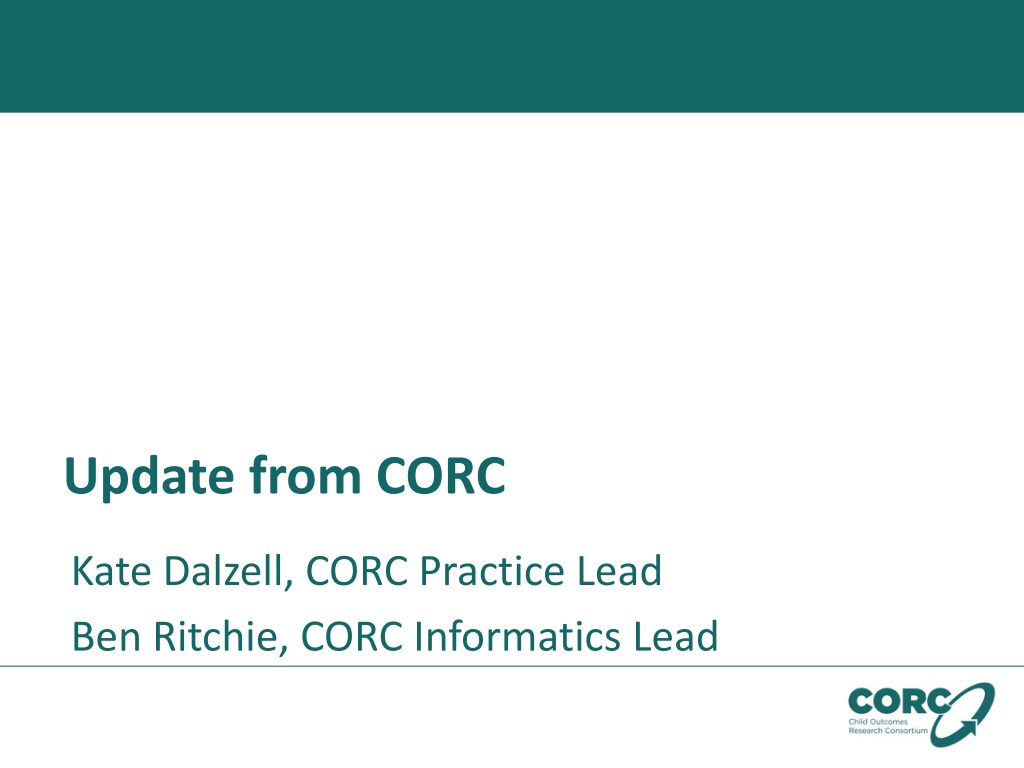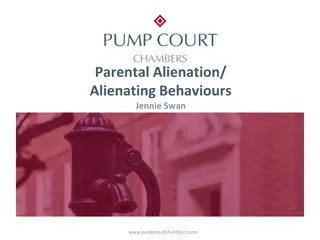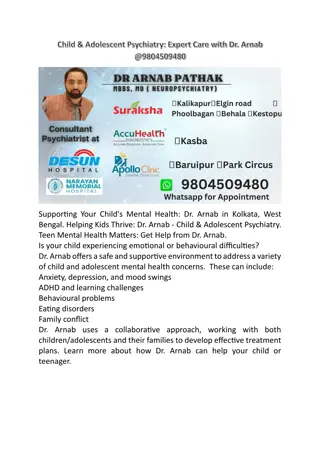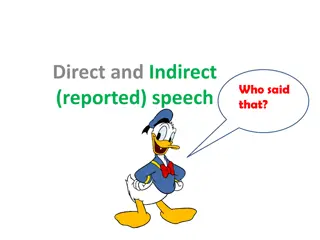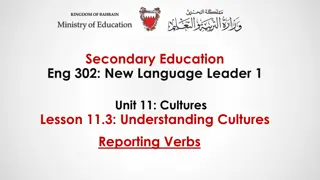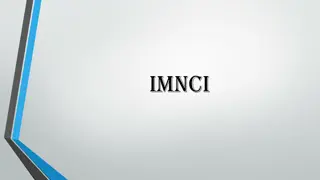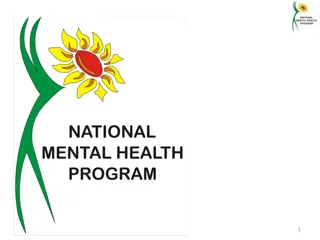Understanding Child and Parent Reported Outcomes in Mental Health Services
This update from CORC focuses on analyzing child and parent-reported outcomes and experiences in mental health services from 2011-15. It discusses challenges in data analysis, engagement through seminars and blogs, key findings, debates on measuring change and service limitations, and trajectories over time. It emphasizes the importance of defining best practices, sharing data, and applying learnings across child mental health services.
Uploaded on Oct 03, 2024 | 0 Views
Download Presentation

Please find below an Image/Link to download the presentation.
The content on the website is provided AS IS for your information and personal use only. It may not be sold, licensed, or shared on other websites without obtaining consent from the author. Download presentation by click this link. If you encounter any issues during the download, it is possible that the publisher has removed the file from their server.
E N D
Presentation Transcript
Update from CORC Kate Dalzell, CORC Practice Lead Ben Ritchie, CORC Informatics Lead
What to look back on - and look out for - Our report on child- and parent reported outcomes and experience data 2011-15 and the work it has stimulated Supporting collation and learning from data Defining, identifying and expanding on best practice use of outcome data Dissemination opportunities to share and to learn from others Applying CORC learning more widely across the system of services supporting child mental health
Child- and Parent-reported Outcomes and Experience from Child and Young People s Mental Health Services 2011-15 First ever analysis of routinely collected outcomes and experience data from 75 mental health services in England Challenges for analysis include diversity of population, measures, metrics, lack of control groups or comparison data and data quality
Engagement and debate Seminars in Leeds, Birmingham, London Blog pieces Response from children and young people Making the findings accessible See our waiting room poster!
Debates Different ways of measuring and defining change Language: how to talk about getting better How to work with flawed, uncertain, proximate, sparse data Do we have realistic expectations for children and young people s mental health outcomes? How do we talk about the limitations of services?
Beginning: focused conversations informed by recovery metrics Given the difficulties you are experiencing, your history and your context I would expect you to have a X% chance of full recovery in terms of A as measured by B by C date. We will look at all ways to help with Y but given your particular history and circumstances the chances of full recovery here are more like X%. Will I recover? However, even if we cannot change things completely, we do find ways to live with these difficulties using strategies we can help you with.
Practice Consider trajectories and end points from the outset http://www.corc.uk.net/media/1490/trajectories_torch.pdf
Emergent work What Constitutes a Good Outcome? Event on 3rd July - Royal Society of Medicine Talking about endings Training now on offer Talking about failure Tony Rousmaniere article, CORC features Using outcome data to inform prognosis, and engage with likely trajectories Research exploring key questions (see later slide)
CORC Research Outcomes for anxiety and depression Julian Edbrooke-Childs, Victoria Zamperoni and colleagues Mapping trajectories for change over time Elisa Napoleone, Prof Chris Evans and colleagues Who fills in outcome measures Carin Eisenstein and colleagues Predicting outcomes Zachary Cohen and others Impact of complexity factors on outcomes Karolin Krause and colleagues Looking at change in specific symptoms over time Praveetha Patalay and others
Learning from data Supporting members to submit data to NHS Digital (MHSDS) Analysing member data to support service improvement CORC reports Bespoke analysis We would welcome your feedback on how to continue to make analysis of member data and the wider dataset relevant and valuable Look out for our quickfire survey on data submission
CORC Accreditation Congratulations to: Bromley Y, and YPAS The first organisations to be awarded CORC Accreditation in outcome and feedback measurement!
CORC Best Practice Framework Structured process for working towards best practice Whole system self-assessment, staff survey, and improvement plan development Increasingly used for self-review Liverpool partnership; South Staffordshire; Anna Freud National Centre for Children & Families
Supporting best practice training Programme of training & learning events across the country York, London, Manchester, Embedding best practice and use of outcome and feedback measures Choosing and using measures Interpreting outcome data in children and young people s mental health Now also on offer.. When to stop treatment Sharing and managing outcome data In development Free e-learning on measuring mental wellbeing for less specialist practitioners
Supporting best practice - dissemination New website! Regular blogs Information hub An (increasing) outcome measures database Case studies (showcased in our monthly newsletter) Sussex; Northumberland, Tyne and Wear; AFNCCF; Bromley Y; Tees Esk and Wear Valley; Worcestershire; Berkshire
Broadening engagement Schools members Associate members CORC Network Growing international membership International Event New member consultation group Developing joint bids Look out for Health Foundation Scaling Up Improvement
Applying CORC learning more widely across the system of services supporting child mental health Area approaches to outcome-focus Shared outcome frameworks Looking at different providers data together Support to HeadStart capacity building using data to improve resilience and emotional wellbeing programme in six area partnerships
Resources to help schools Mental Health and Wellbeing Toolkit for schools School training on measuring wellbeing Support to HeadStart partnerships Wellbeing Measurement Framework for schools and colleges
Come and see us in our new offices! Jordan House Brunswick Place London N1 6EB www.corc.uk.net corc@annafreud.org
